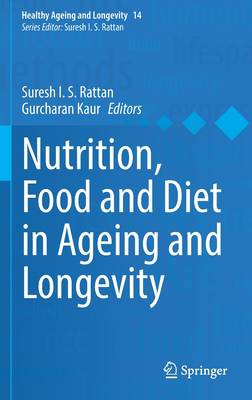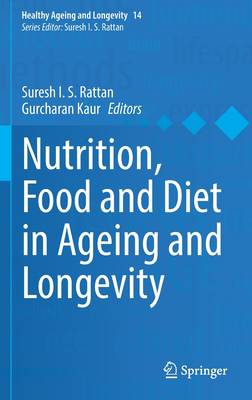
- Retrait gratuit dans votre magasin Club
- 7.000.000 titres dans notre catalogue
- Payer en toute sécurité
- Toujours un magasin près de chez vous
- Retrait gratuit dans votre magasin Club
- 7.000.0000 titres dans notre catalogue
- Payer en toute sécurité
- Toujours un magasin près de chez vous
Nutrition, Food and Diet in Ageing and Longevity
Description
This edited volume is a compilation of 30 articles discussing what constitutes food for health and longevity. The aim is to provide up-to-date information, insights, and future tendencies in the ongoing scientific research about nutritional components, food habits and dietary patterns in different cultures. The health-sustaining and health-promoting effects of food are certainly founded in its overall composition of macronutrients and micronutrients. However, the consumption of these nutrients is normally in the form of raw or prepared food from the animal and plant sources.
The book is divided into four parts and a conclusion, and successfully convenes the well-established information and knowledge, along with the personal views of a diversified group of researchers and academicians on the multifaceted aspects of nutrition, food and diet. The first part reviews the scientific information about proteins, carbohydrates, fats and oils, micronutrients, pro- and pre-biotics, and hormetins, along with a discussion of the evolutionary principles and constraints about what is optimal food, if any. The second part discusses various kinds of foods and food supplements with respect to their claimed benefits for general health and prevention of some diseases. The third part brings in the cultural aspects, such as what are the principles of healthy eating according to the traditional Chinese and Indian systems, what is the importance of mealing times and daily rhythms, and how different cultures have developed different folk wisdoms for eating for health, longevity and immortality. In the part four, various approaches which are either already in practice or are still in the testing and research phases are discussed and evaluated critically, for example intermittent fasting and calorie restriction, food-based short peptides, senolytics, Ayurvedic compounds, optimal food for old people, and food for the prevention of obesity and other metabolic disorders.The overreaching aim of this book is to inform, inspire and encourage students, researchers, educators and medical health professionals thinking about food and food habits in a holistic context of our habits, cultures and patterns. Food cannot be reduced to a pill of nutritional components. Eating food is a complex human behavior culturally evolved over thousands of years. Perhaps the old adage "we are what we eat" needs to be modified to "we eat what we are".
Spécifications
Parties prenantes
- Editeur:
Contenu
- Nombre de pages :
- 642
- Langue:
- Anglais
- Collection :
- Tome:
- n° 14
Caractéristiques
- EAN:
- 9783030830168
- Date de parution :
- 04-10-21
- Format:
- Livre relié
- Format numérique:
- Genaaid
- Dimensions :
- 156 mm x 234 mm
- Poids :
- 1093 g

Les avis
Nous publions uniquement les avis qui respectent les conditions requises. Consultez nos conditions pour les avis.





